The landscape of mental health care in the UK is evolving rapidly, driven by advancements in data analytics. This article delves into how data analytics can be harnessed to enhance patient care within the UK’s mental health services, providing valuable insights for healthcare professionals, policymakers, and the general public.
The Role of Data in Mental Health Care
In today’s digital age, data serves as a powerful tool in transforming mental health care. From public health systems like the NHS to private practitioners, the collection and analysis of health data are crucial in understanding and addressing the mental health needs of the population.
In the same genre : What are the key considerations for implementing machine learning in UK’s agriculture sector?
Data analytics allows for the evaluation of vast amounts of information from diverse sources, including patient records, social care databases, and real-time health monitoring systems. By leveraging data, mental health services can identify trends, predict outcomes, and tailor interventions more effectively. This holistic approach ensures that patient care is personalized and evidence-based, ultimately leading to better health outcomes.
The integration of big data and digital technologies in mental health care also facilitates the identification of at-risk individuals, enabling early intervention and prevention strategies. For instance, analysis of social care and primary care data can reveal patterns indicating potential mental health issues, allowing healthcare providers to act proactively.
Topic to read : How can UK-based SMEs use chatbots to improve customer service interactions?
Moreover, data analytics supports healthcare professionals in making informed decisions. By accessing comprehensive health data, clinicians can develop more accurate diagnoses and treatment plans, improving the overall quality of care. The use of data analytics in mental health services is not just about improving individual patient outcomes; it also enhances the efficiency of the entire care system.
Enhancing Patient Engagement and Access to Care
One of the significant benefits of data analytics in mental health services is its ability to enhance patient engagement and access to care. By analyzing patient care data, healthcare providers can identify gaps in services and address barriers to accessing mental health support.
Data analytics enables the identification of underserved populations and the tailoring of interventions to meet their specific needs. For example, analysis of NHS data can reveal areas with limited access to mental health services, prompting targeted initiatives to improve service delivery in these regions. This ensures that all individuals, regardless of their location or socio-economic status, receive the care they need.
Furthermore, digital platforms and tools, supported by data analytics, empower patients to take an active role in managing their mental health. Online support services, telehealth consultations, and mobile applications provide convenient and accessible options for seeking care. These digital solutions are particularly beneficial for individuals who may face stigma or other barriers to accessing traditional face-to-face services.
Data analytics also contributes to the development of personalized care plans. By analyzing patient data, healthcare providers can identify specific treatment preferences, monitor progress, and make adjustments in real-time. This individualized approach fosters a sense of empowerment and engagement among patients, leading to better adherence to treatment plans and improved outcomes.
In addition, data analytics can enhance the coordination of care among different healthcare providers. By sharing relevant patient information in a secure and efficient manner, healthcare professionals can collaborate more effectively, ensuring that patients receive comprehensive and integrated care. This holistic approach improves the overall patient experience and reduces the risk of fragmented or duplicated services.
Leveraging Data for Predictive Analytics
Predictive analytics is a powerful tool that can revolutionize mental health care by predicting patient outcomes and enabling early interventions. By analyzing historical and real-time data, healthcare providers can identify patterns and trends that indicate the likelihood of future mental health issues. This proactive approach allows for timely intervention and prevention strategies, ultimately improving patient outcomes.
For example, data analysis can identify individuals at risk of developing conditions such as depression or anxiety based on factors such as past medical history, demographic information, and social care data. By flagging these individuals early, healthcare providers can offer targeted interventions and support before their condition worsens. This not only improves the individual’s quality of life but also reduces the burden on the healthcare system by preventing the escalation of mental health issues.
Moreover, predictive analytics can aid in resource allocation and planning. By forecasting future demand for mental health services, healthcare providers can ensure that resources are appropriately allocated to meet the needs of the population. This includes staffing, training, and the provision of necessary facilities and equipment. By optimizing resource allocation, mental health services can operate more efficiently and effectively.
Data analytics can also contribute to the development of evidence-based treatment protocols. By analyzing patient outcomes and treatment responses, healthcare providers can identify the most effective interventions for different mental health conditions. This knowledge can inform the development of standardized treatment guidelines, ensuring that patients receive the best possible care based on the latest evidence.
Furthermore, predictive analytics can support the identification of potential crisis situations. By monitoring real-time data from various sources, such as electronic health records and wearable devices, healthcare providers can identify early warning signs of a mental health crisis. This allows for timely intervention and support, reducing the risk of severe outcomes and improving patient safety.
Addressing Challenges and Ensuring Ethical Use of Data
While the benefits of data analytics in mental health care are significant, it is essential to address the challenges and ethical considerations associated with its use. One of the primary concerns is the privacy and security of patient data. Healthcare providers must ensure that data is collected, stored, and analyzed in a secure manner, adhering to relevant regulations and guidelines.
Transparent communication with patients regarding the use of their data is crucial in building trust and ensuring informed consent. Patients should be informed about how their data will be used, who will have access to it, and the potential benefits and risks associated with its use. This empowers patients to make informed decisions about sharing their health information and promotes a sense of ownership and control over their data.
Another challenge is the potential bias in data analysis. It is essential to ensure that the data used in analytics is representative of the population and free from biases that may lead to inaccurate conclusions or disparities in care. Healthcare providers must continuously monitor and evaluate the data sources and algorithms used in analytics to identify and address any potential biases.
Moreover, the integration of data from various sources can be complex and requires robust data governance frameworks. Healthcare providers must ensure that data from different systems and platforms can be seamlessly integrated and analyzed, enabling comprehensive and accurate insights. This requires collaboration and standardization across different healthcare organizations and stakeholders.
Additionally, the ethical use of data analytics involves ensuring that the insights generated are used to benefit patients and improve their care. Healthcare providers must avoid using data for discriminatory purposes or solely for financial gain. The focus should always be on improving patient outcomes and ensuring equitable access to mental health services.
The Future of Data Analytics in Mental Health Care
As technology continues to advance, the potential of data analytics in mental health care will only grow. The integration of artificial intelligence (AI) and machine learning algorithms holds promise for even more sophisticated and accurate analysis of health data. These technologies can enhance the ability to predict outcomes, identify patterns, and develop personalized treatment plans with a high degree of precision.
Moreover, the increasing availability of real-time data from wearable devices, mobile applications, and other digital platforms will enable continuous monitoring and support for individuals with mental health conditions. This real-time data can provide valuable insights into patients’ daily lives, helping healthcare providers to identify triggers, monitor treatment progress, and intervene when necessary.
The use of data analytics in mental health care also opens up opportunities for innovative research and clinical trials. By analyzing large datasets, researchers can gain a deeper understanding of the underlying causes of mental health conditions and develop targeted interventions. This can lead to the discovery of new treatments, therapies, and preventive strategies, ultimately improving patient outcomes and advancing the field of mental health care.
Furthermore, data analytics can facilitate collaboration and knowledge sharing among healthcare professionals, researchers, and policymakers. By leveraging platforms such as Google Scholar, professionals can access and share the latest research findings, best practices, and evidence-based guidelines. This fosters a culture of continuous learning and improvement, driving innovation and enhancing the quality of mental health services.
In conclusion, the use of data analytics has the potential to revolutionize patient care in the UK’s mental health services. By harnessing the power of data, healthcare providers can enhance patient engagement, predict outcomes, and improve the overall quality of care. However, it is crucial to address the challenges and ethical considerations associated with data use to ensure that the benefits are realized in a fair and responsible manner. As technology continues to evolve, the future of mental health care looks promising, with data analytics playing a central role in transforming patient outcomes and advancing the field.











